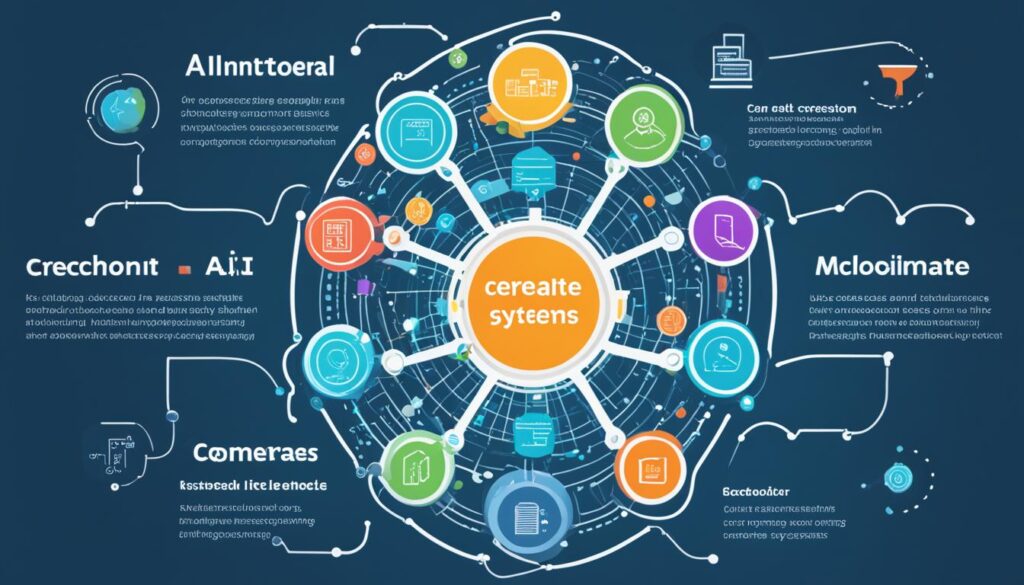Welcome to the Beginner’s Guide to Learning AI! Whether you’re a complete beginner or have some basic knowledge, this guide will provide you with the resources and tips you need to start your AI learning journey. Don’t worry if you feel overwhelmed, we’ve got you covered!
AI, or Artificial Intelligence, is a fascinating field with endless possibilities. But where do you begin? How do you start learning AI as a beginner? In this guide, we’ll break down the essentials and help you take the first steps towards becoming an AI enthusiast.
By the end of this guide, you’ll have a solid understanding of the basics of AI, know where to find the best learning resources, be familiar with popular programming languages for AI, and have hands-on experience with practical projects. Let’s dive in!
Key Takeaways:
- AI is an exciting field with unlimited potential for beginners to explore.
- This beginner’s guide will provide you with the necessary resources to start your AI learning journey.
- Understanding the basics of AI is crucial before delving deeper into the subject.
- There are various learning resources available, including online courses, tutorials, books, and interactive platforms.
- Mastering programming languages like Python and R will enable you to implement AI algorithms and work with data.
Understanding the Basics of AI

Before diving into AI, it’s important to understand the fundamentals. This section will cover the key concepts that form the building blocks of AI, providing you with a solid foundation for further exploration.
“Artificial intelligence is the future of humanity, and understanding its basics is the first step towards embracing its potential.”
Machine Learning
Machine learning is a subfield of AI that focuses on developing algorithms and statistical models that enable computers to learn and improve from experience, without being explicitly programmed. It involves the analysis of large datasets to identify patterns, make predictions or decisions, and automate tasks.
Deep Learning
Deep learning is a subset of machine learning that utilizes artificial neural networks inspired by the structure and function of the human brain. Through the use of multiple layers of interconnected nodes, deep learning algorithms can extract high-level features and representations from raw data, enabling the development of sophisticated models for tasks such as image recognition and natural language processing.
Neural Networks
Neural networks are computational models consisting of interconnected nodes, or artificial neurons, that mimic the behavior of biological neurons. These networks process and transmit information through complex patterns of connections, enabling learning, pattern recognition, and decision-making.
Algorithms
Algorithms are step-by-step procedures or sets of rules that solve problems or perform specific tasks in AI. They define the logic and decision-making processes behind AI systems, enabling them to process data, make predictions, solve problems, and learn from experience.
By grasping these foundational concepts of AI, you’ll gain a clear understanding of its core principles and mechanisms. This knowledge will serve as a solid stepping stone for your AI learning journey, empowering you to explore more advanced concepts and applications.
| AI Basics | Key Concepts |
|---|---|
| Machine Learning | Developing algorithms that enable computers to learn and improve from experience. |
| Deep Learning | Utilizing artificial neural networks to extract high-level features and representations from data. |
| Neural Networks | Computational models that mimic the behavior of biological neurons, enabling learning and decision-making. |
| Algorithms | Step-by-step procedures or rules that solve problems and perform specific tasks in AI. |
Now that you have a solid grasp of the basics, you’re ready to explore the diverse world of AI applications and continue your learning journey. In the next section, we will delve into the best resources available for beginners to enhance your understanding and gain practical knowledge in AI.
Learning Resources for Beginners

Finding the right learning resources is crucial when starting your AI journey. Luckily, there are plenty of options available to help you gain practical knowledge and hands-on experience in AI. Whether you prefer online courses, tutorials, books, or interactive platforms, these resources will provide you with the tools you need to succeed.
Here are some of the best AI resources for beginners:
Online Courses
- Coursera: Offers a wide range of AI courses taught by industry experts.
- Udemy: Provides comprehensive AI courses suitable for beginners.
- edX: Collaborates with top universities to offer AI courses for all skill levels.
Tutorials
- TensorFlow: Provides a collection of AI tutorials and guides for beginners.
- Pandas Documentation: Offers detailed tutorials on AI data manipulation and analysis using Python.
- PyTorch: Features a variety of tutorials on AI topics, including machine learning and deep learning.
Books
- “Artificial Intelligence: A Modern Approach” by Stuart Russell and Peter Norvig
- “Hands-On Machine Learning with Scikit-Learn, Keras, and TensorFlow” by Aurelien Geron
- “Deep Learning” by Ian Goodfellow, Yoshua Bengio, and Aaron Courville
Interactive Platforms
“AI is the new electricity. Just as electricity transformed almost everything 100 years ago, today I actually have a hard time thinking of an industry that I don’t think AI will transform.” – Andrew Ng
Interactive platforms provide a hands-on learning experience and allow you to apply AI concepts in practice. Some popular interactive platforms for beginners include:
- Kaggle: Offers AI competitions and access to datasets for real-world practice.
- Google Colab: Provides a cloud-based platform for running AI experiments and building models.
- Codecademy: Features AI courses and interactive coding exercises for beginners.
Remember, the key to success in learning AI is consistent practice and utilization of resources that suit your learning style. Explore these recommended resources and find the ones that resonate with you. With dedication and perseverance, you’ll be equipped with the knowledge and skills to excel in the field of artificial intelligence.
Programming Languages for AI

To effectively work with AI, you need to learn a programming language. This section will discuss popular programming languages used in AI, such as Python and R, and provide recommendations for beginner-friendly resources and tutorials. By mastering these languages, you’ll be able to implement AI algorithms and analyze data.
Popular Programming Languages for AI
| Language | Advantages |
|---|---|
| Python | Easy to learn, vast library support, widely used in AI research and industry |
| R | Specialized for statistical analysis and data visualization, used in machine learning |
Python is highly recommended for beginners due to its simplicity and versatility in AI applications. It offers a wide range of libraries, such as TensorFlow and Keras, that facilitate machine learning and deep learning tasks. R, on the other hand, is ideal for statistical analysis and data manipulation, making it a preferred choice for researchers and data scientists.
Learning a programming language is a crucial step in your AI journey. Whether you choose Python or R, both languages provide powerful tools and resources to explore the world of AI.
When starting, it’s important to refer to beginner-friendly resources and tutorials to ensure a smooth learning experience. Online platforms like Coursera and Udemy offer comprehensive AI courses, while books like “Python for Data Analysis” and “Hands-On Machine Learning with R” provide in-depth guidance for beginners.
Remember to practice regularly and apply your programming skills to real-world projects. This hands-on experience will solidify your understanding of AI concepts and algorithms, paving the way for further growth and expertise in the field.
Hands-on Projects and Practice
Applying what you’ve learned through hands-on projects is essential for solidifying your understanding of AI. By actively practicing AI, you’ll enhance your skills and problem-solving abilities. This section will introduce you to practical projects and exercises that allow you to implement AI algorithms, work with datasets, and gain valuable experience.
One of the best ways to get started with AI for beginners is by participating in Kaggle competitions. Kaggle is a platform that hosts data science challenges where you can apply AI techniques to solve real-world problems. It provides a collaborative environment where you can learn from other data scientists and improve your skills through friendly competitions.
Another hands-on project you can undertake is building a simple chatbot. This project will give you the opportunity to work with natural language processing and develop a basic conversational AI system. You can use Python and libraries like NLTK or spaCy to build your chatbot and train it on a dataset of conversations.
If you prefer working with image recognition, you can try your hand at building a basic image classifier using deep learning. TensorFlow and PyTorch are popular libraries for building deep learning models. You can start by following online tutorials or courses that guide you through the process of training an image classifier using a dataset like CIFAR-10 or MNIST.
“Learning by doing is the most effective way to master AI. By working on hands-on projects, you not only reinforce your theoretical knowledge but also gain valuable insights and skills that are crucial in the field of AI.” – Dr. Andrew Ng
Remember, the key to learning AI is practice, persistence, and curiosity. Engaging in hands-on projects allows you to apply what you’ve learned, encounter challenges, and refine your problem-solving abilities. Don’t be afraid to experiment and explore different AI techniques to expand your knowledge.
Conclusion
Congratulations on completing this beginner’s guide to learning AI! By following the steps and utilizing the resources provided, you have laid a strong foundation for your AI journey. Remember to keep learning, practicing, and staying updated with the latest advancements in AI. With dedication and perseverance, you can become proficient in AI and unlock a world of possibilities. Good luck!
FAQ
How do I start learning AI as a beginner?
To start learning AI as a beginner, it’s recommended to have a basic understanding of programming. Start by familiarizing yourself with foundational concepts such as machine learning, deep learning, neural networks, and algorithms. There are numerous online courses, tutorials, and books available specifically designed for beginners. Engaging in hands-on projects and practicing your skills will further enhance your learning experience.
What are the basics of AI?
The basics of AI include machine learning, a branch of AI that focuses on developing algorithms that allow machines to learn from data and improve performance without being explicitly programmed. Deep learning is a subset of machine learning that utilizes neural networks with multiple layers to analyze complex patterns and data. AI also involves algorithms, which are step-by-step instructions that guide AI systems to perform specific tasks.
What are the best resources for beginners to learn AI?
There are several excellent resources available for beginners to learn AI. Online platforms like Coursera, edX, and Udacity offer comprehensive AI courses, often taught by industry experts and professors. Books such as “Artificial Intelligence: A Modern Approach” by Stuart Russell and Peter Norvig provide in-depth knowledge about AI. Interactive platforms like Kaggle and AI playground allow beginners to practice and collaborate with other AI enthusiasts.
Which programming languages are best for learning AI?
Python and R are widely regarded as the best programming languages for learning AI. Python is known for its simplicity and readability, making it beginner-friendly. It offers a wide range of libraries and frameworks, such as TensorFlow and PyTorch, which are popular in the AI community. R, on the other hand, is widely used in data analysis and statistical computing. Both languages have extensive community support and numerous resources available for beginners.
How can I gain practical experience in AI as a beginner?
One effective way to gain practical experience in AI is by working on hands-on projects. Start with simple projects, such as building a classification model or predicting housing prices, and gradually increase the complexity. Kaggle, a machine learning competition platform, provides real-world datasets and problem statements to practice your skills. Additionally, joining AI communities and participating in open-source projects can further enhance your practical knowledge.
